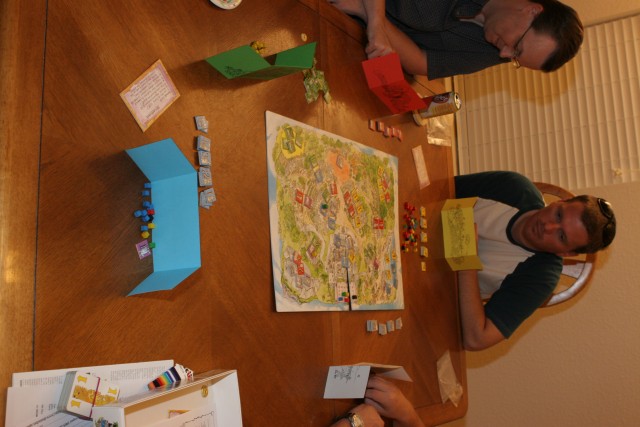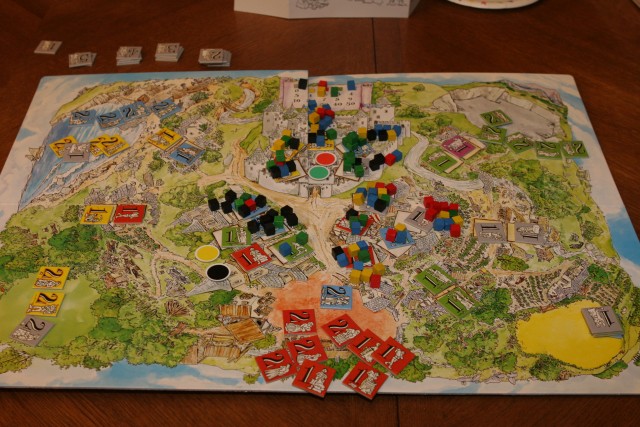
First up was another old game and one we haven’t played in quite a while: Keytown. Of course, we had to read the rules, for I didn’t remember anything about it. And, after we answered all of the questions that came up during the rules discussion, we started playing the game. This is an area majority game where the pieces that you use for majority are townspeople. You start out with 6 level 1 people. You can increase them in two ways. First, you can birth more of them in cottages. Second, you increase their levels in villages. Both of these actions can be fought against by your opponents. In the cottages, the person who has the lowest count will have two babies (level 1 people). For ties, both people will have one baby. In the villages, only the three people who have the lowest count will be promoted. Ties are bad here — no one is promoted. The count is determined by the level of the person and the number of blocks that are “supporting” the person. Blocks are counted as one apiece except when one time modifiers (a x2 or a x0) are played in an area. The block are “mined” from 5 different resource locations around the board. Players who put the most numbers (counting their levels) will mine first with ties resolved by nearest to the start player. Keep in mind that there are limited numbers of blocks in the game. Since blocks are bad things and work against you when you are promoting or birthing your people, the reward for having them played on your people is that you get to keep them for later rounds. After four rounds of play the game is over. Your final score is the square of each of the levels of your people minus any victory points that you used to bid for start person. The bidding for start player is a meta-action. It will interrupt normal play and, once it is resolved, it will change the player order immediately.

The last round was quite the free-for-all. I should have realized that my people were not going to be promoted to level 3 and I should, instead, have concentrated on birthing more people. Jon (green) has only two people in one town and concentrated all of his cubes in stopping both of my people in that same town. He won that battle but I think that he should have put his twos in that town (9+9 vs 4+4). In another town, Mike (yellow) was making sure that I was not promoted. Fortunately, I was able to retaliate and keep his person from being promoted as well. In the third town, I was lucky and people left me alone. The scores were all close at the end of the game. What hurt Jon and Mike was the bidding victory points for start player. Jon went from 1st to 2nd and Mike went from a tie for 3rd to 4th. I went from 2nd to 1st since I bid 0!
John leaves which left us with four people. Hrm, what game can we play with four people? Do I even need to ask this question??
What would you expect with two experts versus two newbies? The answer would be a total slaughter. But I think that some of it was the luck of the card draw. Still, we won the game by two winning conditions: 1000 points and 1000 point differential! If you remove all of the tichu bets and 1/2 points, our team only scored 200 points more than the other…
| GT/T | Team #1 | GT/T | GT/T | Team #2 | GT/T |
|---|---|---|---|---|---|
| MarkH & Jon | Doug & MikeCh | ||||
|
65
|
35 | ||||
| 105 | T+ |
195
|
|||
| T+ | 405 | 195 | |||
| T+ | 525 |
275
|
|||
| 725 | 175 | T- | |||
| 925 | 75 | T- | |||
|
1000
|
T- | 0 |
